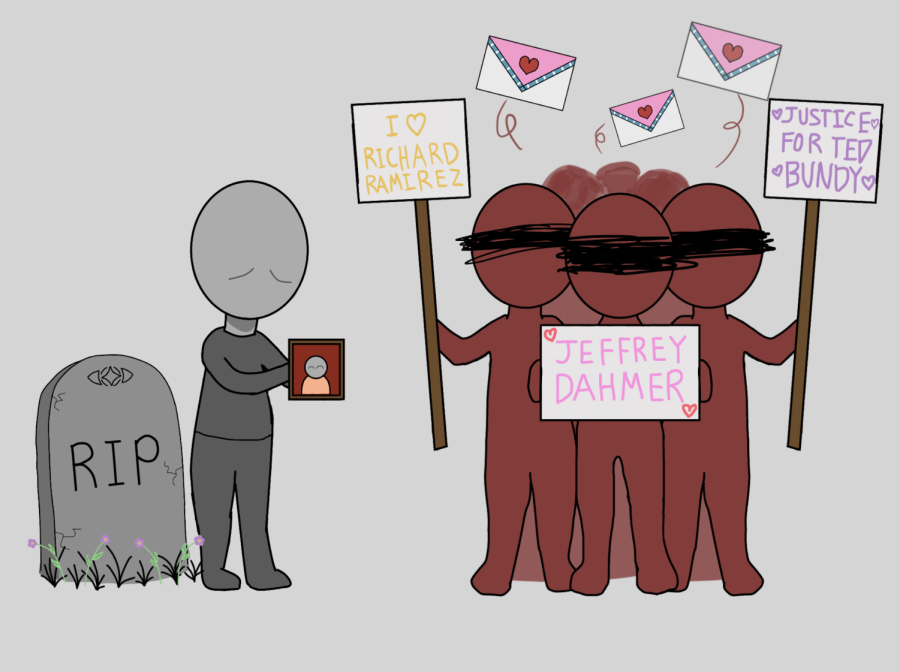Romanticizing Serial Killers Harms the Victims
Fans of serial killers will send love and support to their idols, while the victims’ loved ones are trying to grieve.
You may have a favorite celebrity. These celebrities might be your favorite musician, actor or influencer. You may send them fanmail, which they may read in the comfort of their own homes. You may support the celebrity by showing up to their concerts or finding an opportunity to meet them. You may even dress up as them for Halloween.
But for some people, their favorite celebrity is a serial killer. Instead of showing up to a concert, they show up to their murder trial. They even dress up as these serial killers for Halloween. They romanticize and idolize these mass murderers to the point of obsession.
The gross romanticization of these mass murderers inflicts harm on the victims and denies the true horror of their actions. The best way to consume true crime is to focus on the victims rather than idolize the serial killers.
Netflix’s new release, “Dahmer – Monster: The Jeffrey Dahmer Story,” about the serial killer Jeffrey Dahmer who murdered 17 teenage boys in the 1990s, has brought the issue of romanticizing serial killers further into the light by bringing forth an entirely new fanbase for Dahmer.
The series attracted a group of people who wished that the show was more gruesome, as they were left “undisturbed” by the show’s portrayal of Dahmer’s crimes, according to Newsweek. The underplaying of the deaths of the victims is dehumanizing. It might have not seemed gruesome to those viewers, but to the families of the victims, the cruel portrayal of their loved ones’ deaths brings back the pain they felt at the time of the murder.
Rita Isbell, sister of Errol Lindsey who was one of Dahmer’s victims, talked about her portrayal in the Netflix series, with The Hollywood Reporter.
“Her hair was like mine, she had on the same clothes. That’s why it felt like reliving it all over again,” Isbell said. “It brought back all the emotions I was feeling back then.”
A TikTok recently went viral where the creator, @kirsten.soap, wore earrings with Dahmer’s face on them. Commercializing serial killers trivializes the crimes that they committed by turning them into an accessory for everyday wear.
Sophomore Danica Yoelle Dagdag said she feels that this type of commercialization is unethical.
“Sometimes I feel that it is unethical because people make coloring books and merch out of these serial killers, and they profit off of these serial killers,” Dagdag said. “None of that funds goes to the victims or the victim’s family.”
On top of the unethical commercialization, most of Dahmer’s victims were gay men who “were for the most part poor and African American, Asian or Latino,” according to Encylopedia Britannica.
Adding on, a person who belongs to the LGBTQ+ community is four times more likely to be a victim of violent crime, according to the UCLA Williams Institute of Law.
By romanticizing Dahmer, the fans are causing a community that already struggles with having a voice in mainstream media to have their problems further minimized. Romanticizing serial killers cause the communities they affect to struggle to further bring attention to the issues that plague them.
Another example of the extreme obsession with serial killers is Ted Bundy, a famous serial killer who confessed to 28 murders, but it is estimated that he killed at least 100 people, according to Encyclopedia Britannica.
During his trial, fangirls showed up wearing clothes and dyeing their hair similarly to the victims, according to Refinery29. This cosplaying of victims trivializes their horrible deaths by turning it into a way for them to support Bundy, while their loved ones are trying to get justice.
Fans of Richard Rameriz have also dismissed the feelings of his victims. Ramirez, otherwise known as the Night Stalker, killed 13 people in the 1980s, according to Encyclopedia Britannica. He also married his fan, Doreen Lioy. At age 14, when Ramirez was in jail, she sent love letters to him and even visited him, believing in his innocence.
“He’s kind, he’s funny, he’s charming,” Lioy told CNN in 1997. “I think he’s really a great person. He’s my best friend; he’s my buddy.”
By describing a man on trial for the multiple murders as “kind” to a major news publication, Lioy spreads a narrative that could be used to harm victims by making it harder for their side to be believed by the general public or the judge, according to the New York Times.
The victims of these homicides have had lives taken away from them suddenly. The fans of these serial killers do not truly understand that by supporting these serial killers, they are disrespecting the life of the victims.
Our society prioritizes the stories of criminals over the stories of the victims, disrespecting their memories and their pain. When we consume true crime content, we should take the serial killer’s horrible actions with the weight that it deserves, by campaigning for media focused on the victims and rejecting sensationalized versions of these true events. Instead of empathizing with the killers, we should remember the lives of the victims, who have unfortunately passed away.
Your donation will support the student journalists of Portola High School. Your contribution will allow us to purchase equipment and cover our annual website hosting costs.

Maitri Allani is the Media Director and a Business Manager for her second and final year of Portola Pilot. She loves to write and read, especially horrible...

Claire Chan is the front page editor and news photo editor for her second and final year on the Portola Pilot. She is looking forward to making the best...




